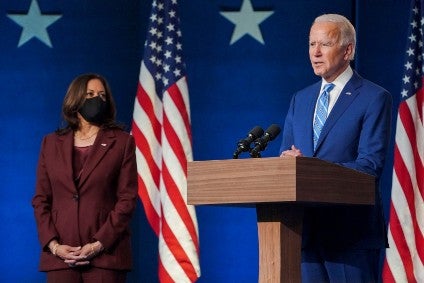
Consumer Brands Association, the US organisation representing food and beverage companies, has said it expects a tougher regulatory regime under President-elect Joe Biden.
Turning its attention to the incoming presidency – despite the fact incumbent President Donald Trump has yet to concede defeat in the election – some of the organisation’s key executives have discussed challenges and opportunities under a Democrat-run White House.

Discover B2B Marketing That Performs
Combine business intelligence and editorial excellence to reach engaged professionals across 36 leading media platforms.
Geoff Freeman, the organisation’s president and CEO, said: “Conventional wisdom suggests that federal agencies will be more aggressive, and Congress will be gridlocked. Yet the picture is far more complex.”
In its post-election briefing to consumer packaged good companies, Consumer Brands said there will be opportunities for firms as “Democrats attempt to advance their policy agenda, roll back Trump initiatives and seek opportunities for bi-partisan cooperation on selective issues”.
Freeman suggested the industry is “in a fundamentally different place today than four years ago” and now “employs a consumer-centric mentality that seeks to advance solutions to vexing challenges, including packaging sustainability, transparency, product and ingredient traceability and supply chain optimisation”.
He said: “With these changes at Consumer Brands and the support of our members, we are well-positioned to position brands favourably, go on offence, work with leaders in both parties and drive meaningful results.”

US Tariffs are shifting - will you react or anticipate?
Don’t let policy changes catch you off guard. Stay proactive with real-time data and expert analysis.
By GlobalDataHistorically, a Democrat-run White House has tended to keep a tighter rein on consumer-facing industries than Republican ones that favour ‘lighter-touch’ regulation.
Meghan Stasz, vice president of packaging and sustainability at Consumer Brands, said: “While the industry will face new challenges related to a more aggressive regulatory environment, and potential legislative challenges will take shape as new chairmen and leadership positions are filled, we will be presented with plenty of opportunity.”
She said she expects climate change will take centre stage. “Plans to rebuild infrastructure may finally take shape and should include the country’s recycling system,” she said.
Betsy Booren, senior vice president of regulatory and technical affairs at Consumer Brands, said: “With a Biden administration, we can expect everything from environmental statutes to chemical and product safety laws will be considered for aggressive regulatory programmes.
“Some of the more challenging issues the CPG industry will face – and that Consumer Brands will prioritise for action – are business transparency, product scrutiny and dealing with an outdated regulatory system.”
Tom Madrecki, vice president of supply chain, at the organisation, said: “CPG companies are well-positioned to seize the moment and advance supply chain solutions in coordination with the Biden administration, particularly as consumer trust in our industry has grown throughout the pandemic.”
He added: “Rumours of the CPG supply chain’s demise during Covid-19 were greatly exaggerated, but the light shone on supply chains through empty store shelves and panic buying presents an opportunity to call for a number of CPG priorities, including a White House Office of Supply Chain, strengthened public-private coordination and critical supply chain mapping by the government.”





